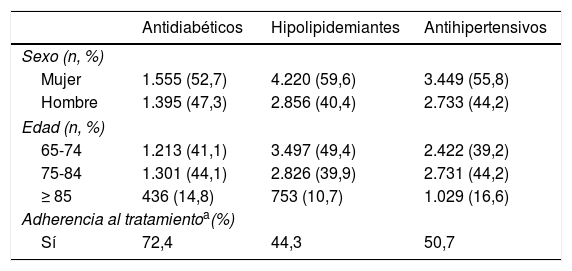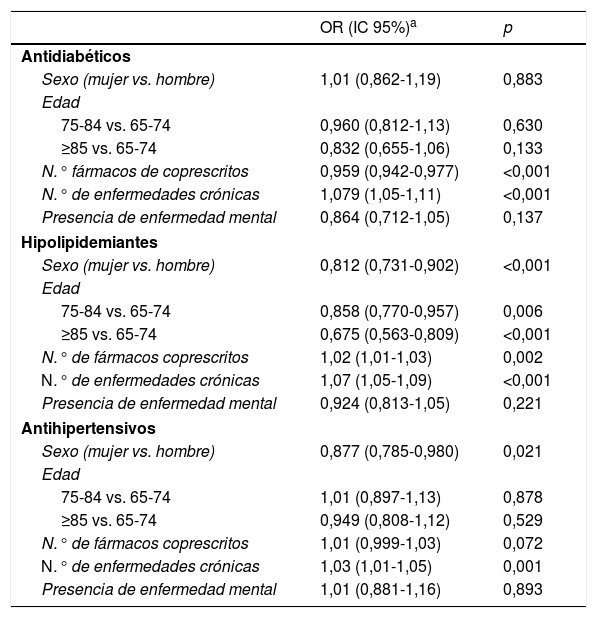Varios estudios han puesto de manifiesto un cumplimiento terapéutico subóptimo en la población general, sobre todo en ancianos y en enfermos crónicos. El objetivo de este estudio es describir la adherencia al tratamiento de diabetes mellitus, dislipidemia e hipertensión arterial, e identificar los factores que la influencian.
Material y métodosEstudio observacional transversal retrospectivo sobre 16.208 pacientes mayores de 65 años de la Cohorte EpiChron, que iniciaron tratamiento en monoterapia de un antidiabético, un hipolipidemiante o un antihipertensivo en 2010. La adherencia se midió mediante el cálculo de la relación de posesión de medicación durante un año de seguimiento, considerándose adherentes los casos con posesión de medicación ≥80%. Se realizó un estudio descriptivo y un modelo de regresión logística para identificar los factores predictores de baja adherencia.
ResultadosLa adherencia a los antidiabéticos, antihipertensivos e hipolipidemiantes fue del 72,4; 50,7 y 44,3%, respectivamente. Se observó un aumento en la adherencia del 3-8% por cada enfermedad crónica adicional del paciente. La presencia de enfermedad mental no afectó a la adherencia, y el sexo, edad y número de fármacos prescritos no presentaron efectos consistentes.
ConclusionesLos resultados obtenidos ponen de manifiesto una adherencia al tratamiento subóptima en las enfermedades crónicas estudiadas. La adherencia aumentó con el número de enfermedades crónicas, mientras que sexo, edad y número de fármacos no presentaron un efecto consistente. Es necesario investigar si existen otros factores que puedan influir en la adherencia terapéutica, ya que su mejora puede tener mayor impacto en la salud que cualquier avance en las terapias.
Sub-optimal adherence to treatment in the general population has been highlighted in several studies, especially in the elderly and/or chronic patients. This study aims to describe the adherence to treatment of diabetes mellitus, dyslipidaemia and hypertension, and to identify the factors that influence adherence.
Material and methodRetrospective, cross-sectional observational study on 16,208 patients aged ≥65 years from the EpiChron Cohort who initiated monotherapy treatment of an antidiabetic, a lipid-lowering or an antihypertensive medication in 2010. Adherence was measured by calculating the medication possession ratio during one year, considering those cases with medication possession ratio ≥80% to be adherent. We performed a descriptive study, and a logistic regression model was used to identify the predictors of low adherence.
ResultsAdherence to antidiabetics, antihypertensive and lipid-lowering drugs was 72.4%, 50.7% and 44.3%, respectively. An increase in adherence of 3-8% was observed for each additional chronic disease suffered by the patient. The presence of mental illness did not affect adherence, and sex, age and number of prescribed drugs did not present consistent effects.
ConclusionThe results obtained show a sub-optimal adherence to treatment for the 3chronic diseases studied. Adherence increased with the number of chronic diseases, while sex, age and number of drugs did not show a consistent effect. It is necessary to investigate if there are other factors that may influence therapeutic adherence, since improving adherence may have a greater impact on health than any progress in therapies.
Artículo
Comprando el artículo el PDF del mismo podrá ser descargado
Precio 19,34 €
Comprar ahora








